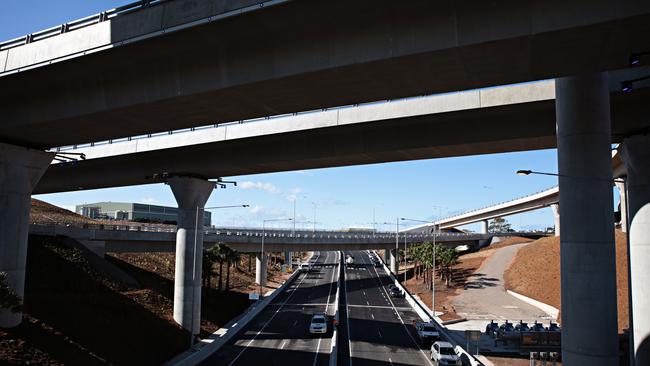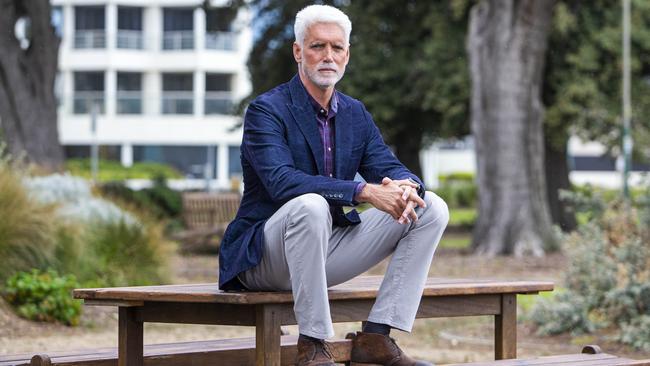Transurban backs a winner with $11.1bn WestConnex buy

It just happens to be a very, very good one.
Transurban boss Scott Charlton is no stranger to the equity market, after hoovering up more than $15bn in six raisings since he started in his position in July 2012.
The latest $4.2bn “top-up” represents the culmination of five years’ work on WestConnex and includes $3.97bn from a 1-for-9 entitlement offer at $13 per security – an 8.3 per cent discount to Transurban’s last trade.
The words tumble effortlessly from Texas-born Charlton’s mouth: “It’s one of the world’s great road assets in one of its greatest cities.”
When completed in late 2023, WestConnex will comprise six assets and three separate concession agreements, each expiring in 2060 and covering a 70km road network linking the city’s west with its central business district, Sydney Airport and Port Botany.
Travel time in peak hour between Parramatta and Sydney Airport is expected to be slashed by about 40 minutes.
There are a number of reasons why at least half a dozen analysts lined up to congratulate Charlton on an investor call on Monday.
First, the Sydney Transport Partners consortium, which bought its initial 51 per cent stake for $9.3bn in 2018, knows the asset well.
While the risk of the project blowing up can never be completely discounted in the difficult, $16.8bn construction phase, it has largely been contained, with 82 per cent of the forecast capital expenditure already spent.
In other words, this is not a Sydney version of the West Gate Tunnel disaster in Melbourne, where the parties are still in dispute and may not find a way out.
Second, the WestConnex concession has another 40 years of life, extending Transurban’s weighted average concession life to almost three decades.
Third, traffic is expected to be solid and consistent once Covid restrictions are eased, helped by a mix of commercial and consumer use – about 40 per cent of the Sydney population will live within 5km of WestConnex, and almost 80 per cent of the greater Sydney freight task is undertaken by road.
The resilience of the mostly completed project has been demonstrated in the most recent lockdown period, when WestConnex was the best-performed of Transurban’s NSW assets.
The fourth factor explaining the market’s enthusiasm is that toll growth is underwritten by an annual, 4 per cent price escalation agreement until 2040, with an inflation-linked toll mechanism until 2060.

Also, and finally, Transurban is banking on an extra $600m in extra capital releases until 2025 from doubling its stake in the STP consortium to 50 per cent, in addition to the $2bn already foreshadowed.
Free cash is expected to support growth in distributions.
If all this comes to fruition, Charlton, wherever he is by then, can kick back and celebrate, knowing that WestConnex was very nearly a missed opportunity.
At the 11th hour in the bidding war for the initial 51 per cent WestConnex stake in 2018, competition watchdog Rod Sims intervened, arguing that a successful Transurban bid could further entrench its position as the majority owner in seven of Sydney’s nine toll roads.
Sims argued, contrary to Transurban’s strong legal advice, that bidders with existing toll-road concessions had an advantage in expanding their footprints because they had access to superior data and financial models.
Ultimately, Transurban saved the day by offering a court-enforceable undertaking to publish its data if it won the WestConnex duel.
Sims was satisfied the undertaking would help neutralise the incumbency advantage in any future battles for toll road assets in NSW.
For a company which started out in 1996 with little more than a bunch of contracts to operate the CityLink toll road in Melbourne, Transurban has been an extraordinary growth story.
Charlton is the first to acknowledge that it’s been the beneficiary of patient, long-term capital provided by the nation’s industry superannuation funds, in particular AustralianSuper and UniSuper chief investment officer John Pearce.
“I don’t think we could have managed the growth we have without the industry funds and the superannuation system, which have helped build a competitive advantage for Australia in infrastructure,” Charlton says.
Transurban is the $100bn-plus UniSuper fund’s biggest single investment.
AustralianSuper, with $235bn in member assets, continues to deepen its ties with the toll-road operator, taking the opportunity to double its stake in the STP consortium from 10 per cent to 20.5 per cent in the WestConnex deal.
In addition to taking up its full Transurban entitlements in the capital raising, the monster fund also stumped up with $250m for a placement at $13.07 per security.
AustralianSuper is not short of cash, both from employer contributions and compounding returns. It expects to be a $500bn fund within about five years, and has identified infrastructure, including toll roads, as a perfect fit for its focus on reliable, long-term returns.
Infrastructure and property are seen by AustralianSuper as mid-risk assets, sandwiched between low-risk cash and bonds at one end of the spectrum and higher-risk equities and private equity at the other end.
When STP successfully bid for the first chunk of WestConnex in 2018, the fund had $13bn invested in infrastructure. That figure has now ballooned to $24bn.
While AustralianSuper wrote its biggest single cheque in the latest WestConnex deal, that honour could soon go to the Sydney Airport transaction if it proceeds.
A consortium including AustralianSuper has bid $23.6bn for the international gateway airport, which is widely regarded as the nation’s premier infrastructure asset.
The bidders are currently undertaking due diligence for the board-recommended offer.
In a further demonstration of the tight links between Transurban and AustralianSuper, as well as the latter’s ambitious infrastructure program, the fund announced late last year that it had acquired a 25 per cent stake in Transurban’s Chesapeake toll road assets in the US.
AustralianSuper partnered with the Canadian Pension Plan Investment Board, which took a 15 per cent stake, with UniSuper taking 10 per cent.
Transurban kept the remaining 50 per cent.
Twitter: @Gluyasr





The $11.1bn purchase by a Transurban-led consortium of the remaining 49 per cent stake in Sydney’s WestConnex motorway project is a bog-standard toll road deal.